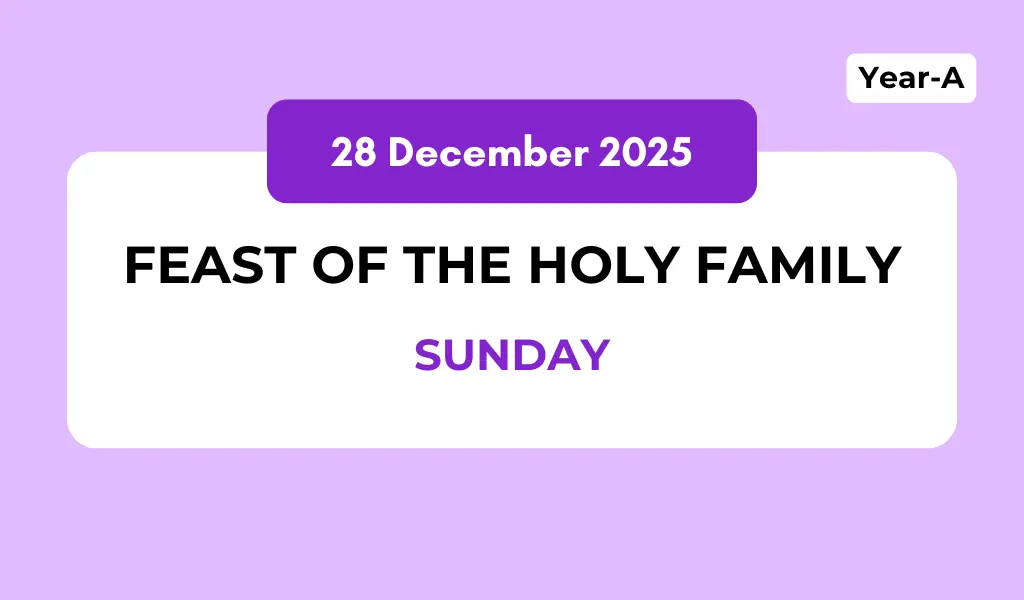Catholic Mass Readings and Reflection January 19, 2025
Second Sunday in Ordinary Time
19th January 2025 (Sunday)
Psalter: Week 2
Reading of the Day
First Reading: Isaiah 62:1-5
For Zion’s sake I will not be silent, for Jerusalem’s sake I will not be quiet, until her vindication shines forth like the dawn and her victory like a burning torch. Nations shall behold your vindication, and all the kings your glory; you shall be called by a new name pronounced by the mouth of the LORD. You shall be a glorious crown in the hand of the LORD, a royal diadem held by your God. No more shall people call you “Forsaken, “ or your land “Desolate, “ but you shall be called “My Delight, “ and your land “Espoused.” For the LORD delights in you and makes your land his spouse. As a young man marries a virgin, your Builder shall marry you; and as a bridegroom rejoices in his bride so shall your God rejoice in you.
Psalm 96:1-2, 2-3, 7-8, 9-10 (R. 3)
R/. Proclaim his marvellous deeds to all the nations.
Second Reading: 1 Corinthians 12:4-11
Brothers and sisters: There are different kinds of spiritual gifts but the same Spirit; there are different forms of service but the same Lord; there are different workings but the same God who produces all of them in everyone. To each individual the manifestation of the Spirit is given for some benefit. To one is given through the Spirit the expression of wisdom; to another, the expression of knowledge according to the same Spirit; to another, faith by the same Spirit; to another, gifts of healing by the one Spirit; to another, mighty deeds; to another, prophecy; to another, discernment of spirits; to another, varieties of tongues; to another, interpretation of tongues. But one and the same Spirit produces all of these, distributing them individually to each person as he wishes.
Gospel Acclamation
V/. Alleluia
R/. Alleluia
V/. God has called us through the Gospel to possess the glory of our Lord Jesus Christ.
R/. Alleluia.
Gospel : John 2:1-11
There was a wedding at Cana in Galilee, and the mother of Jesus was there. Jesus and his disciples were also invited to the wedding. When the wine ran short, the mother of Jesus said to him, “They have no wine.” And Jesus said to her, “Woman, how does your concern affect me? My hour has not yet come.” His mother said to the servers, “Do whatever he tells you.” Now there were six stone water jars there for Jewish ceremonial washings, each holding twenty to thirty gallons. Jesus told them, “Fill the jars with water.” So they filled them to the brim. Then he told them, “Draw some out now and take it to the headwaiter.” So they took it. And when the headwaiter tasted the water that had become wine, without knowing where it came from — although the servers who had drawn the water knew —, the headwaiter called the bridegroom and said to him, “Everyone serves good wine first, and then when people have drunk freely, an inferior one; but you have kept the good wine until now.” Jesus did this as the beginning of his signs at Cana in Galilee and so revealed his glory, and his disciples began to believe in him.
Daily Gospel Reflection
Second Sunday in Ordinary Time
Opener: In our lives, we all lack something or the other. And we want to solve such situations. The only solution is: Turn to the Lord!
The wedding at Cana is the first miracle of Jesus and the first sign of his divinity. But let us not reduce it only to a sight of power. It connotes a fundamental human situation and a desire. Situations of scarcity, indigence and lack are a normal and regular reality and experience in human life. This lack can be of various kinds: material, physical, emotional, intellectual, social, moral or spiritual. Scarcity and lack are something that is not desired, but resented, resisted and rejected. Because lack makes one worried, dissatisfied and joyless.
This is very clear in the scene of the wedding at Cana. How much tension, anxiety and sadness there was because there was no wine! The whole atmosphere was also gripped by the fear of facing disgrace and shame. They then try to get rid of the scarcity by having and providing more wine. Abundance is sought to remedy all the negative consequences that a lack entails.
Yes, Abundance is a natural human desire and longing. Human beings are created high, in dignity of God’s very divinity. He is also destined for nothing less than Eternity. So there is always a search and struggle for abundance. Abundance dispels tension and worry, uncertainty and fear, dissatisfaction and disgrace, sadness and melancholy. It restores a newfound sense of confidence, honour, satisfaction, tranquility and joy. Therefore, seen in this sense, Seeking abundance in itself is not wrong, because it is desirable and worth having.
But the whole question is: abundance of what? What abundance is sought? An honest eye and reflection will easily make us see that often it is the abundance of worldly things and concerns that is mostly sought and pursued. Many seek an abundance of material things, in the form of money, possessions, property, comforts, luxuries, etc. Many seek an abundance of physical things that gratify the body and carnal urges, such as sumptuous or delicious or varied foods and drinks, sex and sensual pleasures, etc. Many seek abundance of emotional satisfaction, in the form of being wanted, comforted, loved, supported, etc. Many seek abundance of intellectual satisfaction, in the form of knowledge, expertise, academic excellence, and career. Still many others seek an abundance of social concerns, such as status, privilege, prestige, power and position, honor and popularity, commandability and influence, name and fame.
All this research is understandable and to some extent valid, because all these are integral dimensions of our human existence. A human being is certainly a material, physical, emotional, intellectual and social being. But the vital point is: moral integrity and spiritual primacy must be the major concerns of life. An abundance of all other aspects can never give deep and lasting joy and fulfillment. It is only an abundance of virtue and worth, an abundance of love and devotion to God, that can give real satisfaction, joy and fulfillment of life. It is only Jesus and turning to Jesus that gives abundance and thus restores joy and honour. Jesus transforms scarcity into abundance, lack into fullness, uncertainty into security, anxiety into serenity, tension into calm, confusion into clarity, fear into confidence, shame into honour, disgrace into reputation, dissatisfaction into satisfaction, and sadness into joy.
What is particularly remarkable even in this situation of abundance of Jesus, is the Marian mediation. Mary perceives the situation of lack of need, worries about the bridal family, intervenes to do something, turns to Jesus to ask for help and transforms the whole situation into joy.
Today, the miracle of the wedding at Cana, should make us not only pray for favours and miracles in our lives. This will make our faith superficial, reducing it to profit-oriented and ulteriorly motivated, under the spiritual garb. Faith is not seeking Jesus as a miracle-worker, to satisfy and fulfill our various worldly needs and difficulties. Such a faith, which seeks the abundance of worldly things, is very inadequate and defective. True faith should seek Jesus for spiritual abundance, for an integral, value-oriented life, should make us turn to Jesus as our greatest point of reference, source and treasure of life, should increase our trust in Him and intimacy with Him. This miracle should also make us love and venerate Mother Mary as a powerful intercessor and caring guide on our journey of faith.
Furthermore, this miracle should also make us humble and active mediators, who always direct others to Jesus. How sad that in the name of faith and spiritual ministry, some set themselves up as centres of focus and faith! How absurd that those who claim to be ministers and spiritual leaders, try to steal the show, dominate the scene, obscure the centrality of Jesus and to keep people focused only on themselves, hindering people from going beyond Jesus! How foolish it is that Jesus is presented and sought as a mere miracle-worker, a dispenser of favours, a provider of services, who takes care of simple material needs, instead of as a Saviour and Sanctifier, helping us to change morally and spiritually! How wrong it is that Mary is considered an obstacle to Jesus, instead of a facilitator, mediator and guide to Jesus!
Direction: With Jesus and Mary we will not be frustrated or dishonoured, we will not lack, but we will experience abundance and joy. The wine of joy will overflow and overflow to the brim!







